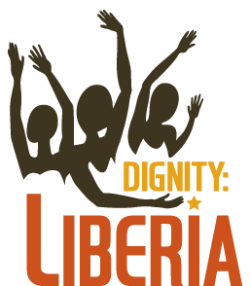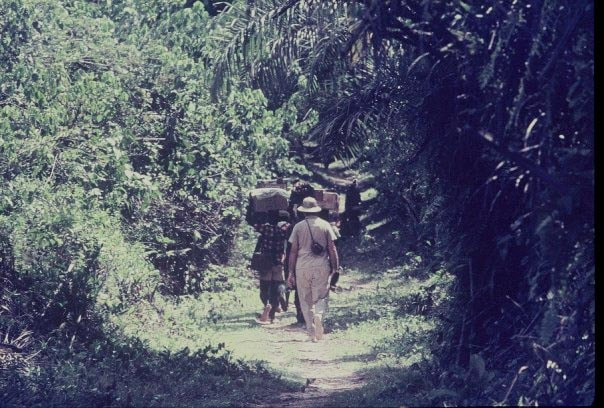Looking at my notes from that trip, beyond the chaos of retrieving a mountain of luggage for 15 people and passing through immigration my first words read, "hot, very hot, and humid." Apparently my initial impressions were confusion and heat. That sounds about right for arriving somewhere new. And equatorial. Our host was organized and cordial and had us and our belongings loaded into vehicles and on our way in an impressively short time.
The 2 hour drive from the airport to the compound where we stayed confirmed that yes, there was still "bush,” or mid-size trees, palms and undergrowth. Yes, the earth was an iron colored red-brown. Yes, women still pounded cassava with large mortar and pestles outside their homes. Yes, the roads were crowded with vehicles, wheel barrows of goods, people, and buses. Despite thinking I was prepared, it was a lot to take in.
Our compound was a former UNMIL site. The office building had been converted to small bedrooms, a kitchen and pantry, a large meeting room and two bathrooms! We had our own well and palaver (open air meeting) hut. From the rooftop of our host's home we could see out to small, one-room houses where women swept and cooked, children played and bathed from buckets, and "life" happened. Across the road was a UN military compound because Liberia wasn't that many years beyond civil war. Still this was better than what television news had led me to expect.
Over the next two weeks we visited an orphanage (war orphans), a clinic, two hospitals (no running water and rationed power from a generator), a nursing school, some government offices, a village (accessible by dirt road), and finally the Fistula Rehab Center. These places did not fit my impressions of pre-war Liberia where hospitals were shiny and neat with new, functioning equipment. Hospital staff functioned well under very difficult circumstances though and were able to make things work. Staff I spoke to were positive despite the little equipment they had. The nursing school instructors proudly showed us their learning lab and explained that they had carried the equipment to safety in Monrovia during the war. They carried books and teaching mannequins and all their supplies 110 miles through fighting and dangerous checkpoints because they believed in a future and they believed in nursing education. That was pretty humbling. At Rehab the young women welcomed us with song and then performed a skit that they use to teach the public about obstetric fistula. They follow-up with personal stories. One young woman told about her 5 day labor in her remote village...she actively labored for about 2 days but then things stopped, she could not feel her legs anymore and soon after began to lose consciousness. Her father valued her life enough to carry her a day to reach a road, to find a ride, and then to spend another day traveling. Her baby died but she survived with a fistula. When I met her she had been successfully repaired.
I think of that favorite photo now and realize that healthcare is still a long walk and a taxi ride away for so many people. Access to prenatal care and trained midwives continues to be difficult for so many women. This is why we as Dignity:Liberia have a dream of building a Maternity Waiting Home and perhaps one day a small surgical center. And maybe we will find a place for women to live and work who have been so injured that they cannot be repaired.
Like those nursing instructors we believe in a future and we believe in the fistula survivors in Liberia.



 RSS Feed
RSS Feed